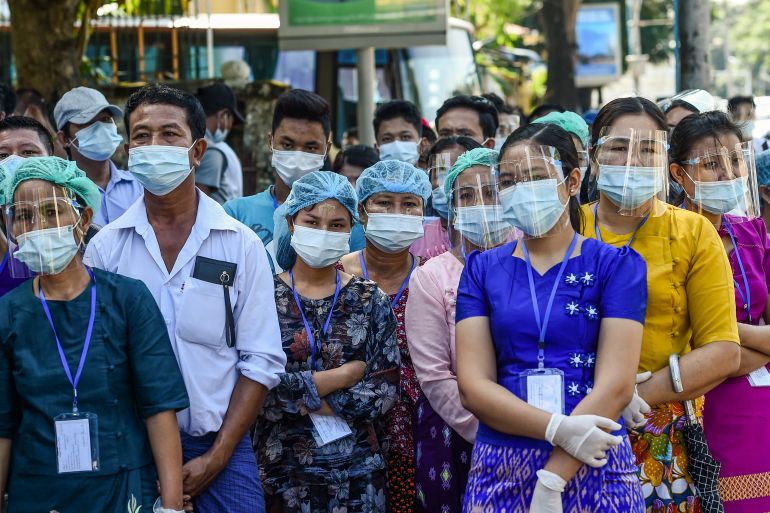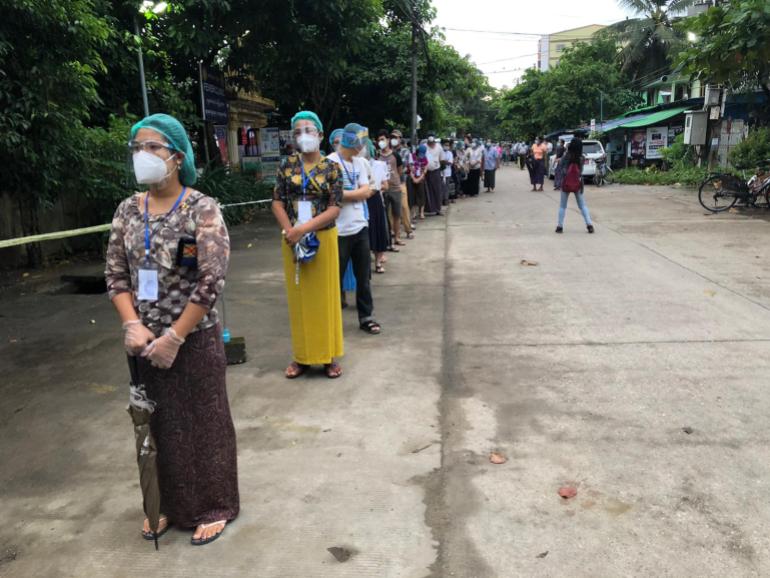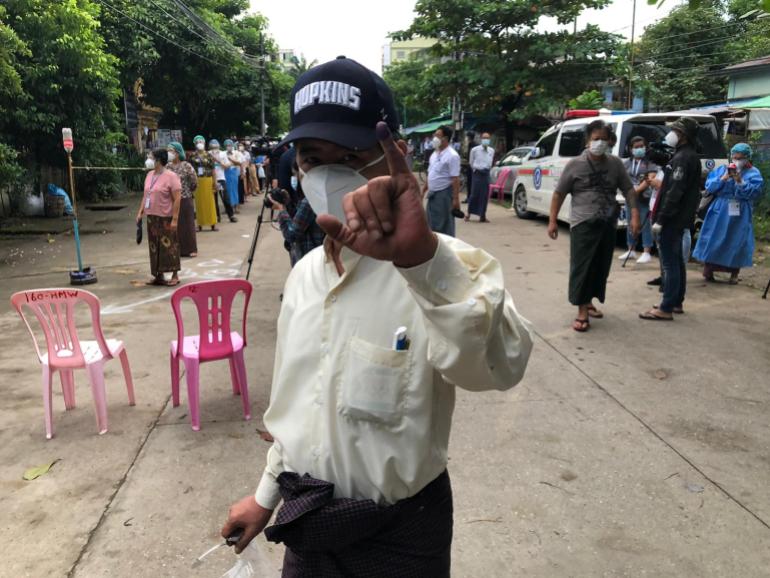‘Only one choice’: Myanmar votes in second democratic election
Aung San Suu Kyi’s NLD expected to triumph in Myanmar’s second democratic vote since the end of military rule.

Yangon, Myanmar – Polls have closed in Myanmar’s general elections – only the second democratic vote in the Southeast Asian country since the end of five decades of military rule – with Aung San Suu Kyi’s National League for Democracy (NLD) widely expected to win re-election.
Sunday’s vote comes amid a resurgence of COVID-19 cases in Myanmar, which has recorded more than 60,000 infections and 1,390 deaths since mid-August.
Keep reading
list of 4 itemsMyanmar’s election in 500 words
Myanmar ‘undermining lifeblood of democracy’ before polls
Myanmar polls: Facebook under scrutiny over hate speech
Opposition parties had called for an election delay over the surge in coronavirus cases, but the governing NLD and the Union Election Commission insisted on forging ahead. Elderly voters were allowed to cast ballots in advance while the government promised to provide adequate personal protective equipment for poll workers and to ensure social distancing at every polling station.
Electoral officials are expected to start announcing results in the early hours of Monday.
In South Okkalapa township in eastern Yangon, Myanmar’s biggest city, hundreds of voters – wearing masks, face shields and gloves – lined up outside a polling booth at dawn to cast their ballots.
Voters in the area were choosing between the NLD’s Thet Naing Soe and prominent democracy activist Ko Ko Gyi, who has criticised the governing party for failing to amend the army-drafted constitution, which allocates a quarter of seats in the parliament to the military, giving it the power to block constitutional reforms.
South Okkalapa resident Aung Myo said he voted for Suu Kyi’s NLD. “She is very strong, strong for the truth and our country,” he told Al Jazeera.


Su Moe Thant, a 23-year-old student, said she was “excited” to cast her ballot.
“I have some friends who don’t want to vote they don’t like the current political system and don’t want to choose and go for no vote. I really don’t like that,” she said. “It’s a democracy you can choose whatever you want. You can vote independent but it’s important to vote.”
‘Fundamentally flawed’
More than 37 million people are eligible to vote in the election to choose members for the upper and lower houses in an election the Human Rights Watch (HRW) has decried as “fundamentally flawed”. The United States-based group last month denounced the exclusion of voters from the ethnic Rohingya minority, the criminal prosecution of government critics ahead of the vote, as well as unequal party access to state media.
Polls were also cancelled in ethnic minority areas, disenfranchising more than 1.5 million people, according to the HRW. The elections commission blamed the move on security concerns amid fighting between the military and ethnic rebel groups.
The region worst-affected by the vote cancellation was Rakhine state, where the military is battling the Arakan Army, a popular rebel group seeking greater autonomy for the Rakhine people. The move tilts the electoral field decisively in the NLD’s favour in a state where it is arguably the least popular, and analysts have warned the conflict in Rakhine may intensify in the wake of the election.
The western state is also home to the persecuted Rohingya minority, who Myanmar views as immigrants from Bangladesh and has barred from registering to vote. More than 730,000 others from the ethnic group fled Myanmar for Bangladesh in the wake of a brutal military crackdown in 2017, and Antonio Guterres, the secretary-general of the United Nations, said on Friday that he hoped Sunday’s vote would allow for refugee returns in “safety and dignity”.
Htoo Htet Naing, head of Accountable Actions for Arakan (AAA), is from a part of Rakhine where voting was cancelled.
“I don’t have any interest in the election. We won’t recognize the coming union government or state government,” she said. “They rejected our civil rights. The right to vote is the very basic right for a democratic transition.”
The AAA organisation had been meeting with different Rakhine-based candidates to help inform voters of their policies and platforms, but the entire programme was upended by the cancellations. “It doesn’t mean anything for us anymore. This government killed our hope and our effort,” Htoo Htet Naing said.
She said she expects conflict to increase after this election, for local people to put even more trust in the Arakan Army, and for some to start calling for independence. But for tonight, the people in Rakhine are planning to drum.
“It’s a traditional movement to address bad things. When bad things are happening in our neighbourhood we always drum to kick them out,” Htoo Htet Naing said.
UN investigators have accused Myanmar’s military of “genocidal intent” in the 2017 campaign against the Rohingya, but Suu Kyi has rejected those claims. The Nobel peace prize laureate remains popular in Myanmar despite widespread international criticism over her government’s handling of the Rohingya crisis and its treatment of other ethnic minorities.
In central Yangon, Wilson, a 60-year-old retired sailor who only gave one name, told Al Jazeera he was “100 percent” for Suu Kyi’s NLD.
“This is a transition period and we have found a good government. We have only one choice, there’s nobody else,” he said outside a polling booth.
“In this country freedom has come. The people can speak freely. When I was born this country was under military. The NLD
only had four years so we have to continue for a new future,” he continued, adding that NLD has been “okay” on race and religion issues.
For her part, Suu Kyi, in her final campaign speech on Thursday, promised to strengthen democracy if re-elected.
Acknowledging grievances over the organisation of the vote, she said the “the important thing is to solve these problems by peaceful means within the boundaries of the laws,” and urged voters to remain calm and maintain “stability”.
The military-backed Union Solidarity and Development Party (USDP) is the NLD’s main opponent in Sunday’s election.
Myanmar’s commander-in-chief Senior General Min Aung Hlaing refused last week to commit to honouring the results of the general election, criticising “widespread violation of the laws and procedures of the pre-voting process”.
But on Sunday, after casting his vote, the general said he “must accept that the result must come from people’s desire”.
“It is undeniable and I agree to it,” he was quoted as saying by the Myanmar Times.